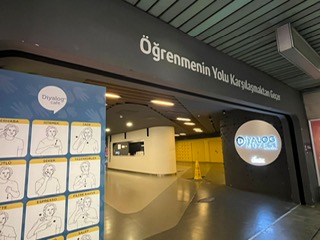
Commodifying Disability as an Experience
Since February 2023, I have been conducting fieldwork on disabled women’s access to and experience of infrastructure under the current populist authoritarian government in Turkey. My research has taken me, among other places, extensively throughout Istanbul, the city with the largest disabled population in the country. I have traveled primarily by public transportation to meet with my interlocutors, most of whom are blind, allowing me to experience urban infrastructures alongside them. While passing through Gayrettepe Station, one of the busiest subway stations in Istanbul due to its location in a business district and near an upscale shopping mall, I observed a sentence written on a black background with white neon points: “Learning is possible through encounters” (Öğrenmenin yolu karşılaşmaktan geçer). This area is home to a museum called “Dialogue in the Dark” and “Dialogue in the Silence,” which provides a multisensory corporeal experience of blindness and deafness targeting non-disabled people as an audience. The museum draws inspiration from other “Dialogue in the Dark” museums located in Europe, and was established by a civil society organization. These museums are significant initiatives aimed at helping non-disabled people understand how “others” experience the built environment, thereby raising awareness about the inequalities and injustices that disabled people may encounter in their daily lives. Disability activism is relatively new in Turkey and values any effort that contributes to the recognition of disability as an identity, which has not been widely acknowledged. Indeed, creating a space for encounter is crucial for cultivating a culture of pluralism, understanding, and care for one another, all of which are crucial for a democracy. In some countries, populist movements are explicitly hostile to disabled folks, and/or ridicule them (e.g. Trump in the US), however, this is not the case in Turkey (disabled women face other challenges, as we will see). So, such initiatives regarding disabled people are quite welcome, as they may contribute to Turkey’s democratization and the inclusion of non-normative bodies and existences. (read more...)
